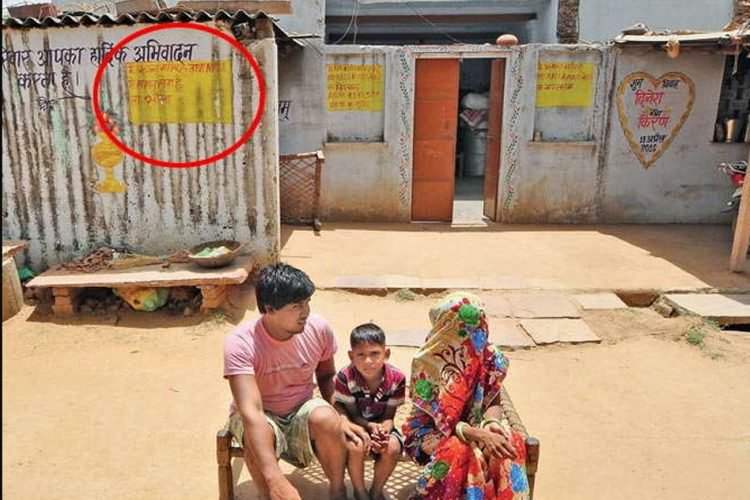Poor Shaming in Rajasthan: A Constitutional Violation
MANISHA SHASTRI
The Government of Rajasthan in an absurd attempt to check violations under the National Food Security Act (NFSA), has stamped almost 1.5 lakh houses in Dausa district of those below the poverty line (BPL), with the statement ‘I am poor’ on the outside. The move has received a lot of flak from several sections of society, the opposition as well as residents of Dausa district.
Embarrassed and humiliated by this move of the state government, several families below the poverty line have removed the stamp put up outside their house and stopped receiving the benefits they are legally and constitutionally entitled to. Outside some houses it was painted not just once, but multiple times.
According to a Dainik Bhaskar report, the painted messages could be seen outside over 50,000 houses in Sikrai and Bandikui tehsils. However, this is not the first time that this has happened. In 2016 too, the local administration had done the same thing.
Villagers have been reportedly hiding their face due to the humiliation caused and have also claimed that they were told that they would be paid Rs 750 for allowing their homes to be marked. Many of those who protested were threatened by officials that their names would be removed from the list of beneficiaries. However, additional collector of Dausa K.C. Sharma has denied that any such directions were given by district administration.
The NFSA was undertaken during the tenure of the UPA government, as per which those belonging to the backward classes would be given 5 kilograms of food grains, per person per month at subsidised rates. Largely, it is those belonging to the scheduled castes, scheduled tribes and minorities that fall under the BPL category and benefit from the scheme.
By labelling the houses of those affected by poverty and humiliating them, not only is the state doing away with its welfare responsibilities and obligations, but it is also violating the Constitution of India and the UN Human Rights Convention (UNHRC). The National Human Rights Commission (NHRC) and civil society organisations must take cognisance of this matter and look into the violation of the ‘right to life with dignity.’ The right to live with dignity is a guarantee under Article 21 of the Indian Constitution. The state and all its machinery are obliged to ensure that all its citizen’s lead a life of dignity and respect. However, here the government seems to be doing the very contrary.
Those affected by poverty already face several challenges and difficulties in their everyday lives. Their circumstances make even the most basic and essential things such as health care, education, and the right to a decent standard of life inaccessible. Their houses being marked, is only more insult to the injury.
The NDA government has often been accused of being anti – poor and pro corporate and industries, in particular with regard to their policies on farmers and loan waivers given to the likes of Adani and Vijay Mallya. Such moves not only go onto prove the NDA government’s anti – poor approach, but also set dangerous precedence for social profiling and marginalisation.
Minister for Panchayati Raj and Rural Development Rajendra Singh Rathore, rather than condemning the incidents, has justified it by alleging that the practice was started by the previous Congress Government. Irrespective of which government may have stated the practice, the practice remains a constitutional violation and a violation of the basic provisions of the UNHRC. The government of Rajasthan has also justified the move by stating that by marking the house, they are ensuring only those in need avail the benefits of the scheme.
While the intention here maybe noble, the manner in which it has been approached is not. It is only going to add to further marginalisation and social exclusion of these families.
NFSA officials have claimed that since the list prepared under the previous Congress government has not been updated by the present state government, many families in need are being deprived of the benefits. The current government, rather than addressing the fault lines within the systems and fixing what is broken, seems to have found an easier way in blaming the opposition and humiliating the poor.
Any nation looking to develop, has to take along and support its most vulnerable citizen’s rather than humiliating them and pushing them towards hunger and even more extremely affects of poverty.
Despite being a welfare state, India does little to fulfil its obligations towards citizen, particularly towards those affected by poverty; the least the state could do is not push its citizens into starvation by humiliating and shaming them, for the state’s failure to socially and economically uplift them.





